God, I’m so uncomfortable. My palms are sweating and my heart is pounding. Why did I think this was a good idea? I could be home right now with my girlfriend and my dog, having a beer and watching Netflix. But no.
Instead, I’m staring directly into the eyes of this small, pale man with a huge red beard. Andrew. I think he said his name was Andrew. From Alaska. His breath smells like peppermint and pine needles. Did he eat pine needles? Can you eat pine needles?
My thoughts are racing. I shift my feet. Andrew shifts his. We continue to stare at each other. Finally, Andrew takes a deep breath and speaks. “If you really knew me, you’d know that I smoke too much pot and use it as a coping mechanism. And you would know I’m ashamed of it.”
His gaze lowers, embarrassed. He looks back up and we lock eyes. Now it’s my turn.
“If you really knew me, you’d know that I sometimes drink too much alcohol and it worries me.”
I have never spoken those words out loud before. I instantly feel lighter, like a giant
weight I didn’t even know was there has been lifted. Andrew smiles, happy to not be alone in his confession.
“Thanks,” he says.
“Thank you,” I say.
We’re standing in a clearing in Big Sky, Montana, the most appropriately named town in America. It’s 20 minutes to sunset and the clouds are just starting to turn purple around the edges. From where we are, you can turn 360 degrees and see for miles in every direction. The tall grass gives way to dense pine trees, which give way to jutting, snow-capped mountains that seem to prop up the big—no, massive—sky.
To our left and right are 16 other men, paired off just like us. Behind us sits a gigantic log cabin that will be our home for the next two nights. After that, we’ll carry 50-pound packs into the backcountry of Yellowstone National Park, where we’ll walk and sleep among the grizzlies, mosquitoes, and stars for three more nights.
We all met maybe an hour ago.
“Nice work, guys.”
That’s Dan Doty, who’s leading this group. “Get to the edge of your comfort zone and then go a little past it,” he continues. “Let yourself open up.”
We have different jobs, different religions, and different numbers in our bank accounts.
Dan is 36 years old, muscular, with reddish-brown hair and a full beard. For the past hour, he’s been walking around in bare feet. Give him a cardigan sweater and a White Russian and he could pass for an outdoorsy version of the Dude from The Big Lebowski. Dan is a cofounder of Evryman, an organization established in 2016 that arranges weekend retreats and weeklong expeditions aimed at teaching men how to access and express their emotions.
The men here occupy different rungs on the socioeconomic ladder and come from all over the country. There’s a woodworker from Seattle. A recently fired hedge-fund manager from Manhattan. There’s a project coordinator from Iowa, a medical-cannabis grower from Arizona, and a guy who owns an Italian restaurant in Queens. At least four guys are ex-military.
We have different jobs, different religions, and different numbers in our bank accounts, but we’ve all spent $3,500 for the same reason: to connect. With nature, ourselves, each other.
“Switch,” says Dan.
My next partner is Aaron. He has close-cropped hair and a well-manicured beard. His arms are covered in tattoos. I will later learn that he spent 14 years in the Army, seven of those as a Green Beret in remote outposts in Iraq and Afghanistan. I will learn about his parachute accident, his brain injury, and his PTSD. I will learn how he went from being a weapons-and-tactics sergeant to the operations manager at Evryman. But right now, he’s just another man in front of me.
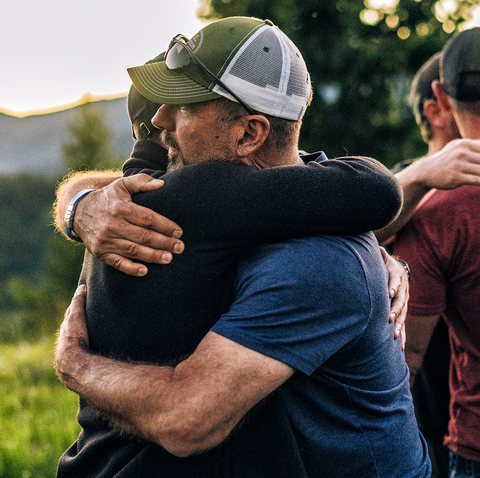
NILS ERICSON
“Get closer,” Dan instructs. “Reach out and put your right hand on the shoulder of the man in front of you.”
Aaron and I move closer. He puts his hand on my shoulder and I put my hand on his. His eyes well up with tears. They’re blue and glossy and beautiful, and I am suddenly so overwhelmed with emotion that my eyes start to water, too.
He just looks so . . . hurt.
Aaron takes a deep breath.
He lifts my hand off his shoulder and places it over his heart. He holds it there. I can feel the thump, thump, thump deep in his chest.
“Finish this sentence,” Dan says. “ ‘The thing I’m most grateful for is . . .’ ”
Aaron and I stare into each other’s eyes. Ten seconds go by. Twenty seconds. The boundaries of my body start to dissolve. I have the feeling of looking into a mirror.
“I’m grateful I’m here with you,” Aaron says finally. “I’m grateful I’m home, close to my wife and my son. And I’m grateful I found this group.”
The sounds of night begin to envelop us. Crickets chirp. A tree leans and groans in the wind. Up and down the line, the men lean, too. They sniffle and sigh.
Tears trace their way down Aaron’s cheek, but he doesn’t wipe them away.
“Men are hurting,” says Dan.
We’re sitting in a coffee shop in downtown Bozeman, Montana. It’s two weeks before the retreat, and I’m here to ask if I can come along.
“Suicide rates are climbing. School shootings. The #MeToo movement and sexual abuse,” he says. “Men are hurting themselves and they’re hurting other people. But men are not getting the help they need.”
Men need to talk to each other. And not just bullshit “locker room” talk about sports and sex.
In Dan’s view, there are two main things hurting men: repression of their emotions and lack of deep human connection. He knows this because he’s seen it with boys. When he was in his 20s, Dan was a therapeutic wilderness guide who led troubled boys through the woods. Overall, he spent 12,000 hours in the backcountry with hundreds of boys. The kind of boys who hurt themselves and each other. The kind of boys who are on a direct path to prison. Or worse.
But slowly, while sitting around the fire, Dan showed these boys how to open up and feel. And he did it by going first. Talking about being scared. Opening up.
“It starts a chain reaction,” Dan says. “When one person opens up, it gives everyone else in the space the permission to do the same. It’s an act of courage.”
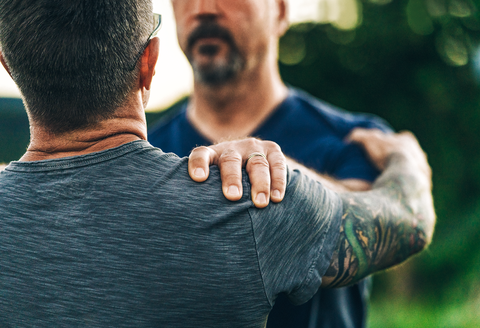
NILS ERICSON
Of course, boys grow into men. And as men grow older, they tend to grow further apart from everyone else.
In other words: Men need to talk to each other. And not just bullshit “locker room” talk about sports and sex, but about real things of consequence: how we’re handling our relationships, the things that scare us, what we’re ashamed of, what we’re proud of, our failures and dreams.
“I went to my first men’s group in 2009 and it fucking blew my mind, and I just knew that I needed it in my life,” Dan says. Men’s groups have been around since the ’60s and are like any other type of gathering in that there’s a set time and a structure. But mostly it’s guys sitting around in a circle, talking with one another about their lives: the good, the bad, and everything in between. “I didn’t even know what a men’s group was,” Dan says. “Some German dude at a dinner party invited me to his group, the Brotherhood NYC. So I went. At that point in my life, I was feeling lost. But after that very first group, I knew I needed to keep coming. And I knew I needed to start something of my own to spread the message.” It would take him a decade to do that.
After leaving his job as a wilderness guide in 2010, Dan became a producer and director of the hunting show MeatEater on the Sportsman Channel. Eventually his passion for men’s work got in the way of his actual work. When his son Duke was born in June 2016, it inspired Dan to take action. “I want Duke to grow up in a world where he can be himself fully,” he says. Five months later, he started Evryman with his friends Sascha Lewis and Lucas Krump and his mentor, Owen Marcus.
Evryman’s first retreat took place in December 2016 at Race Brook Lodge, in the Berkshires of western Massachusetts. Twenty-five men attended. Since then, nearly 1,000 guys have either joined Evryman men’s groups or participated in one of its retreats.
Evryman wants to “get a million men in men’s groups all over the world,” Dan says. It supplies men with the tools and the structure they need to start their own group in whatever city they’re in.
“Rather than focusing on what it means to ‘be a man,’ like it’s some kind of checklist, we’re trying to teach men how to connect to their own experience,” he explains. “Because it’s only when you can fully connect to your own experience and allow yourself to be vulnerable that you can truly connect to others.”
Or, putting it another way: “There are as many ways of being a man as there are men on the planet,” Dan says. “We’re just trying to give them some tools.”
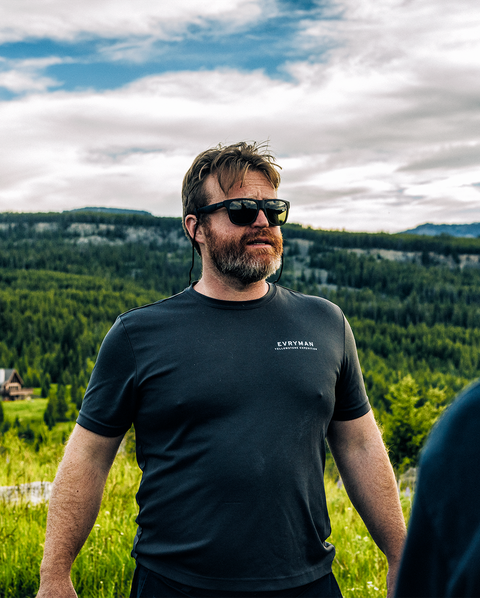
Whether or not guys want those tools is another story. It can be a tough sell to get men together to talk about their feelings. Especially if they have to shell out a couple grand to go on a retreat. However, other organizations, like Junto and the ManKind Project, offer similar retreats, so the movement is growing.
“Some men resist the idea of talking about their feelings and will avoid it at all costs,” says Edward M. Adams, Psy.D., president of the Society for the Psychological Study of Men and Masculinity, a division of the American Psychological Association.
In the ’60s and ’70s, a whole nation of Silent Generation and baby-boomer men started to grapple with their own repressed emotions, just as the women’s liberation movement was picking up steam. In order to support women—and support themselves—men needed to do a new kind of work that had nothing to do with physical labor.
And so began 50 years of trying to define masculinity, with everything from drum circles and sweat lodges to “character stories” built around Jungian archetypes (or the “mythopoeic stage” of human thought). It’s an old topic with a new urgency.
Adams believes that men right now are at a “danger point.”
“Without connection to each other, men tend to lose their sense of identity and their sense of compassion for themselves and others,” he says. “But some guys think this kind of work sounds too soft and not manly. They think they can handle it on their own.”
I can relate.
I’m luckier than most guys. I’ve had a best friend, Jason, for more than 20 years. I’ve had mentors in my life who have challenged me to grow and learn. My dad kissed me and hugged me and told me he loved me. My long-term partner of ten years—a wonderful, intelligent, beautiful woman—pushes me to grow and to love.
Staring into the eyes of another man, talking about my deepest emotions, and blubbering like a baby is near the bottom of my to-do list, right around “punch myself in the balls.”
And yet, if I’m being honest with myself, I do crave more connection in my life. I can be self-centered and callous. I can get wrapped up in appearances and become overbearing—talking over people, interrupting, and manipulating situations to get what I want. I’m not proud of it. Maybe I do need to connect with other men more often.
But will doing it with strangers help?
We stand. Dan gives me a hug and starts to walk out the door, phone in hand.
Wait, I say. What about the article? Can
I join the retreat and write about it?
He looks at me. “Yes,” he says. “But you can’t just be a fly on the wall. You have to jump into the shit with the rest of us.”
Eight of us sit in a circle. It’s Day 2. The midmorning sun shines brightly, but here in our rocking chairs, we’re shaded under the roof of the porch. Against the wall a cord of wood sits with us, neatly stacked, 25 across and 13 high. Fuel ready for a fire.
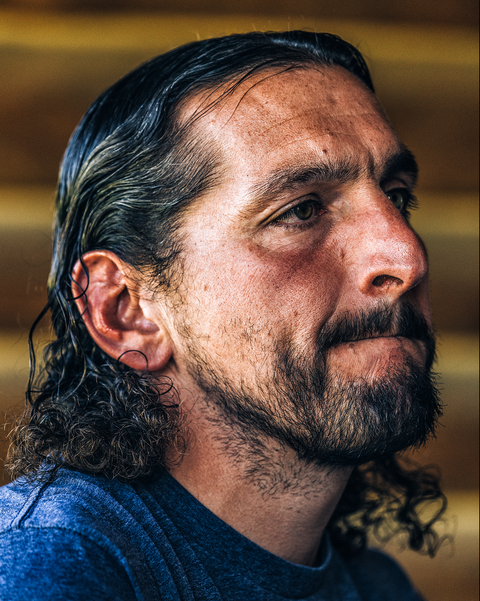
This is our “small group.” There’s Chris, an antiques dealer from upstate New York; Bob, an IT guy at a large community college in California; Foster, an executive-
leadership coach for Fortune 500 companies; and Kris, a former talent agent who left his company and is going back to school for his MBA. There’s also Craig, a former police officer who now installs sensory-deprivation tanks; another Chris, who works at a food co-op; and Blayne Doty, Dan’s dad, from Minnesota.
The rest of the guys are scattered around the house in their own groups. For some of them, this is their second retreat with Evryman. Others are first-timers like me. The purpose of this small group is to give each man time to open up and space to be seen and heard. If all goes well, we’ll end this session with our “work statement,” a short sentence that captures what we need to work on for the rest of the trip. It will become our personal mantra.
Each man gets 30 minutes to become the focus of the group. But it’s not just idle conversation. There’s a process to get us out of our head and into our body. Step 1 is to slow down. Step 2 is to feel what you’re feeling, both physically and emotionally. Step 3 is to share. Easier said than done.
Craig, the former police officer, kicks things off. “I’m grateful that I can spend time with you guys. I get the sense that you don’t know my story, so I just want to share that quickly.
“At the expedition last year, we sat in a bigger circle with everyone. I didn’t know what I was going to say, but when it came time for me to talk, I just fucking . . .
exploded.”
Craig tells us about his life leading up to last year. He had an emotionally distant father. Craig cheated multiple times on his first wife. He tells us about the terrible things he saw as a cop on patrol in Utah. “Shit you can’t unsee.”
“During last year’s retreat, the level of rage I felt was unlike anything I’d ever felt in my entire life. I was shaking and screaming. I had no idea this shit was in me this deep. It scared people.”
After the yelling and the crying and the purging had stopped, Dan had instructed Craig to stand up and walk around the circle of men. “He wanted me to look them in the eye one by one so I could see the support surrounding me.” But Craig could barely meet their gaze.
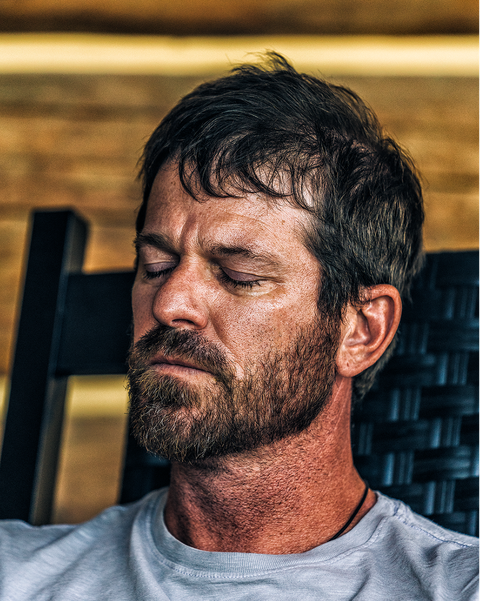
“I was so ashamed,” he says. “But I locked eyes with a guy across from me, and the love pouring out of that man changed everything. It gave me permission to forgive myself.”
And just like that, Craig’s story starts the chain reaction Dan talked about. One guy opens up and everyone else has permission to do the same.
Foster talks about his son, how he lost him for eight years to a methamphetamine addiction before he got clean. “He taught me about what I can control and what I can’t. I put him out on the streets knowing he didn’t have a place to go. I still feel pain from that. But it was the right thing to do.”
Chris the antiques dealer talks about his father and his daughter. “My dad taught me that crying was for little girls. I was taught to never show emotions. Now I get inspiration from my four-year-old daughter. She has so much passion and fire and heart. I see my younger self in her.”
I open up about what it was like to grow up poor. I talk about how I barely graduated from high school and didn’t make it to college and how that made me try so hard to be successful. At some point, I realize tears are running down my face.
“I always feel like I have to perform,” I say. “I feel like I have to do whatever I can to impress you and to be accepted. I want to know what it feels like to stop trying so hard and to just be okay being myself.”
After I finish, Bob looks at me. He reaches over and touches my knee.
“Nate, you don’t have to say or do anything to fucking impress us. We all see you and accept you as you are.”
It’s the nicest thing anyone has ever said to me.
That evening, after three hours of rafting Class III rapids on the Gallatin River—an activity that pushed us to communicate and work as a unit—the entire group is gathered in the living room, where a large fire crackles in the corner. Tomorrow we go into the woods.
Dan speaks. “This circle is gonna close out the first phase of the trip and prepare us for Phase 2. I’m feeling the love and the presence of every man in here. Let’s share our work statements.”
One by one, we share the sentence we need most right now. The thing that will serve as our compass while in the woods.
“I honor my needs.”
“I feel loved.”
“I’m sad, afraid, and angry.”
“I need to let go.”
“I have feelings.”
“Turn down the heat.”
“I’m proud of myself.”
“I go toward the fear.”
Mine is “Don’t try.”
The words float into the center of the room and break open in front of everyone.
In the woods, there are burned trees next to new ones. There are distant mountains. Patches of snow. Grizzly bear tracks. One day I count 37 mosquito bites on my arms and back. Conversations are overheard, joined, then abandoned.
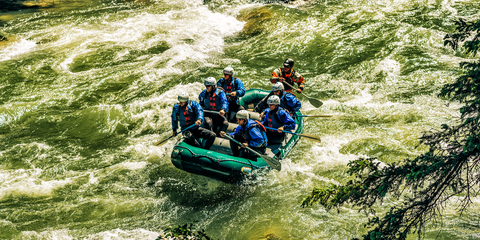
NILS ERICSON
“The best porn is when the girl actually gets off and has a crazy orgasm, right? Or when two girls use the same dildo at the same time?”
“Shitting in the woods is complicated. You have to start making moves when you’re at a six or a seven on the ten scale. You really gotta plan your shits out here.”
What do you expect? We’re guys. But the chitchat about sex and shitting is tempered with real talk. We ask questions. We learn about one another.
Luke, a business-systems consultant, lost his wife to breast cancer; now he has a son to raise on his own. Cody, a former Coast Guard rescue swimmer, lost a little girl to the water. He got her out but she died the next day. A man from Manhattan and a man from rural Ohio talk about transgender rights. A group of us reevaluate our past sexual behavior and how we treated women. Some guys have clear consciences. Others do not.
Every evening, we sit around the fire and watch the flames lick the wood. We sleep under the stars, talking to each other like kids at a sleepover. Every morning, we piss in the woods, pack up camp, eat breakfast, and start walking.
It’s day 4 of the retreat and Andrew from Alaska is sitting on a log, crying intensely. I walk over to him and put my hand on his shoulder. We sit together.
“I’m not ready to be a father,” he says in between sobs. Andrew tells me that he and his wife are adopting her sister’s kids. Their father died and their mother is not in a position to take care of them. They need a family. They need a dad. It’s the right thing to do. And so they’re living with Andrew.
“I’m so scared I’m going to fuck them up,” he says. He’s crying so hard he’s shaking. The violence surprises him. “What’s happening?” he says. “I need to lie down.”
They know me better than some of my best friends. I trust them all implicitly.
I help him to the ground. He’s shaking so much he can’t control it. A few other guys come over. One bends down and grabs Andrew’s ankles. Another touches his arm. Dan walks over, bends down, and puts his hand directly on Andrew’s chest, palm open. He speaks in a quiet but firm voice.
“You’ve been holding this shit in for so long, Andrew. Let yourself feel it. We’re right here.”
Andrew lets out a small yelp. His face is wet with tears. I look at the faces of the other men around me, their eyes soft and watery. We sit there and let Andrew cry. I feel a deep sense of what I can only describe as love wash over me, flooding every part of my body.
After a few moments, Andrew starts to get his bearings. “Thank you,” he says. “Thank you.” His crying turns to soft laughter. “Holy shit,” he says under his breath. “Holy shit.”
Later, on the trail, I catch up with Dan to ask him what happened. “Andrew’s been wound so tight, but being out here in nature with us opened him up,” he says. “He’s likely never allowed himself to feel that deeply.”
I look behind us. Andrew is walking up the trail, smiling and looking off into the distance, his arms swinging freely. Like he doesn’t have a care in the world.
Our last night in the woods. Around the fire, Dan asks us if we know what a drip torch is. “A drip torch is a handheld fuel tank with a long spout, filled with a mixture of 30 percent gasoline and 7o percent diesel,” he says. “Wildland firefighters use drip torches to ignite prescribed burns. They walk around and drip flaming liquid on the ground to start fires on purpose.”
These small fires have two objectives, Dan explains. They influence the behavior of larger, more destructive fires and stop them from burning everything. And they remove excess debris, renew the ground, and start a new phase of natural growth in an ecosystem.
Sometimes the best thing you can do—for yourself, for the people you love, for the world—is to walk around and start your own fires. To talk about how you feel, express your emotions. Sure, it takes courage. But if you let it do its work, the fire will help you grow.
We stand and gather into a circle, our arms around each other. Over the past few days, I’ve learned some things about these guys that their closest friends and family members are not aware of. I know what scares them. I know what excites them. I know what keeps them up at night and what keeps them going the next day. They know me better than some of my best friends. I trust them all implicitly. We’ve been together for less than a week.
As the sun starts to set behind the mountain, Aaron, the former Green Beret, speaks. “Guys, sometimes I feel like I’m running on one cylinder. But right now, we’re a well-oiled machine. We’re running on all cylinders. We created this engine. So let’s harness all the power, love, acceptance, and gratitude we’ve experienced and let’s take it back into the world. Let’s take this love back into our relationships, into our jobs, into the strangers we meet on the street, and into our communities. Let’s make this world a better place.”
The day I get out of the woods, my girlfriend of ten years breaks up with me. I barely have time to put down my backpack. I did not see this coming.
We sit on the couch and talk for three hours. She tells me that for the past year she’s felt like she’s had one foot in and one foot out of the relationship. I tell her I have so much love and respect for her. I tell her I support her completely. I tell her that we’ll both be fine. It’s the most challenging thing I’ve ever done. Then she’s out the door to stay with a friend for the night.
She will later tell me that that conversation was the most open and connected she’d ever felt with me. She’ll tell me that a wall came down. That there was no ego. That she felt like I really saw her.
A couple hours later, I get a text from Charlie, one of the guys from the Evryman retreat. He tells me he’s taking an extra week off before he heads back home. He’s going to drive through my town and wants to know if I want to hang out.
I tell him what happened. About my relationship. About everything. He responds immediately: “I’m sorry, man. But I’m pumped for you. Take care of yourself for the night. I’ll be there tomorrow.”
I turn off my phone, sit on the couch, and do what Dan taught me: I check in with myself. I close my eyes and breathe deeply. I allow myself to feel my emotions fully. I allow life to move through me.
The tremors come. The tears flow and I can taste the salt in my open, smiling mouth.
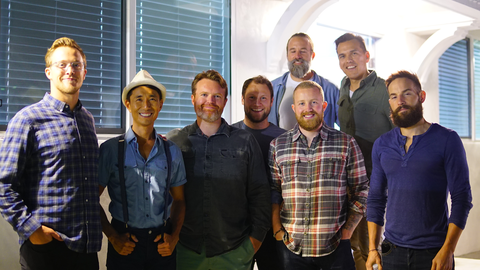
Source: Read Full Article
